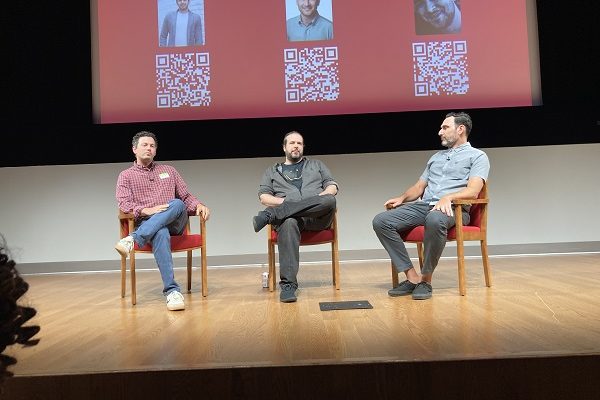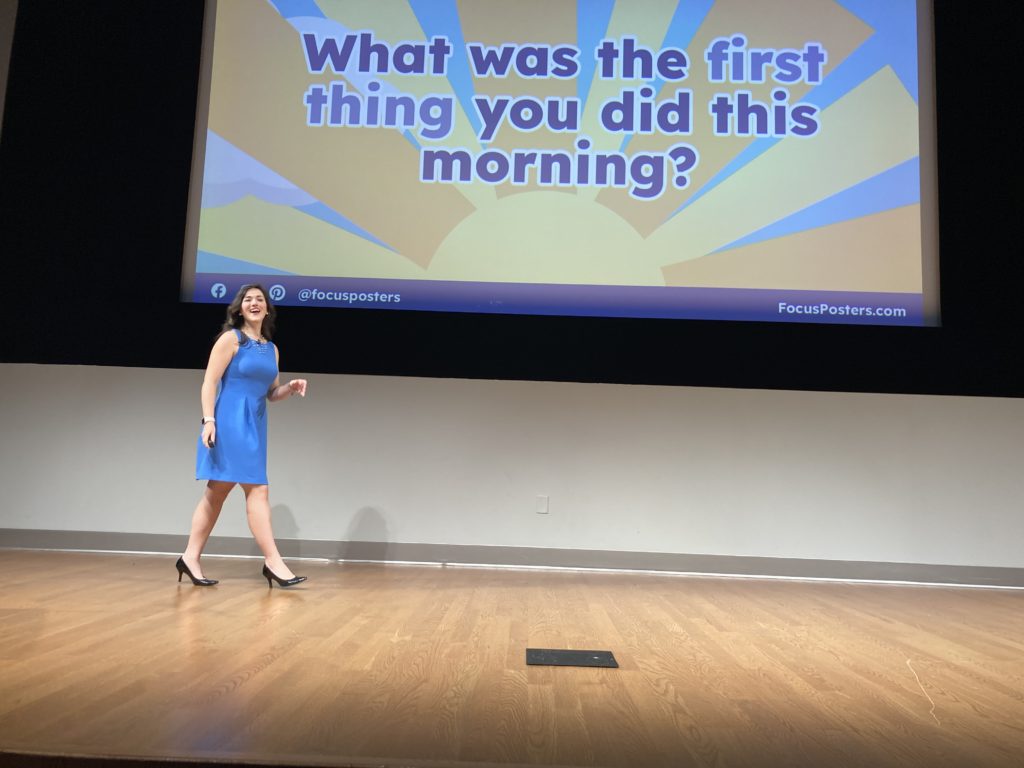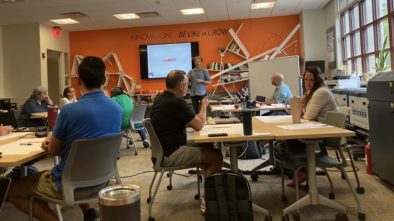Montclair Starts Up Meetup Features Google, NVIDIA Experts on AI
In September, NJTechWeekly.com visited the Montclair Entrepreneurs Meetup, which has been renamed “Montclair Starts Up.” There, representatives from Google and NVIDIA (Holmdel) spoke first about their companies’ approaches to artificial intelligence (AI), and then joined with the audience in a spirited discussion about AI in general. The event took place at Montclair State University.
Zack Rosenberg, cofounder and CEO of Qortex (Montclair), and one of the meetup’s organizers, recapped the previous meetup for the crowd. Then the main part of the evening began with a pitch by Annalyce P. D’Agostino, cofounder and CEO of Focus Posters, a Montclair startup that helps kids feel in control by promoting routines that work for them, even if they can’t read yet. The posters even include characters that look like the individual child. In the future, the product could be used by neurodiverse individuals and by adults with dementia, she told the audience.
Annalyce P. D’Agostino, cofounder and CEO of Focus Posters | Esther Surden
Next to speak was Aaron Luber, director of the New York-based Google Labs BD (Business Development). He told the audience that Google has been working on AI for a long time, but the industry is still in its early stages of incorporating AI and generative AI into its products. “We’re just scratching the surface of how this is going to play out for consumers, for users, for entrepreneurs, for government — from the ease of being able to click a button and create content to being able to take data and make very, very complex queries out of that data.”
He added, “We’ve been using AI very specifically, across so many of our products for many, many years. I think a lot of you use these products, whether it’s Google Photos, Google Maps or Google Lens.” The Lens is a software product Luber worked on that lets people use their cameras to see and understand the world around them. A simple example is translating a tourist information sign by holding up the camera to the sign. “These are all things that are using artificial intelligence to power experiences that billions and billions of people use every single day using Google products.”
NVIDIA makes almost all the technology that powers AI today, said Chris Brown, who works for the company’s Inception Program, which is based in New York. The program focuses exclusively on startups and entrepreneurs, seeking ways to help them scale and grow. Graphics processing units (GPUs) like the ones made by NVIDIA are the foundational technology for training and inferencing using AI models, Brown said. “We have almost a VC type of approach to how it is that we work with startups. We invest billions of dollars to develop software to address certain use cases. And then we give it away, knowing that if it’s successful, that the company will scale. And, so, GPUs will be used somewhere out in the world.
“Our goal when we work with a startup is to first understand what it is that you’re doing. And then we go into all of these tools up here,” he said, pointing to a slide that presented specific use cases. “And, ideally, we want to hold your hand and be able to connect you with resources on the developer relations team to help you build more efficiently and more effectively.” NVIDIA also acts as an adviser and consultant, to help startups as they scale. It also wants to open the startups’ doors to more customers.
Some takeaways from the panel discussion:
- AI will be built into almost all software in the future.
- Companies like NVIDIA are betting that all businesses will need specialized processors to drive their AI.
- AI will probably not eliminate jobs. Instead, it will make employees more efficient and productive.
- Many people are using generative AI right now. Rosenberg gave an example: “I write a newsletter every single week [in the form of an] AI advertising newsletter, which I do not actually write. I use large language models to write for me. I submit articles that I find throughout the week. I ask it to summarize them, and then I put those brief snippets into a newsletter. I then take the newsletter, put it back into the large language model and ask it to create LinkedIn posts, which I then use to promote the newsletter that I’ve pre-written. All of this goes out to about 14,000 people a week who have no idea that I’m not actually sitting there at my computer,” he said.
- There are continuing moral questions surrounding the use of AI. For example, governments acknowledge the need to watermark images and video content so they doesn’t get morphed and manipulated by means of AI. Government regulations and standards will be important for enforcing the ethical use and growth of AI.
- Big tech companies have joined in efforts to rein in AI, and they are being very responsible about where this technology is going and how it is being incorporated into products. One of the panelists marveled at how well these companies are working together on this. “We’ve been very vocal about being very responsible about the way these products come to market,” Luber said. “Is everything going to land 100 percent correctly?” Maybe not, he implied, but they have a chance to come out well because they are rooted in policy and rooted in good intentions, he said.





